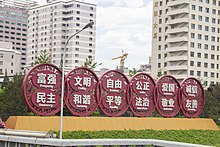
The Chinese Communist Party (CCP), officially the Communist Party of China (CPC), is the founding and sole ruling party of the People's Republic of China (PRC). Under the leadership of Mao Zedong, the CCP emerged victorious in the Chinese Civil War against the Kuomintang. In 1949, Mao proclaimed the establishment of the People's Republic of China. Since then, the CCP has governed China and has had sole control over the People's Liberation Army (PLA). Successive leaders of the CCP have added their own theories to the party's constitution, which outlines the party's ideology, collectively referred to as socialism with Chinese characteristics. As of 2023, the CCP has more than 98 million members, making it the second largest political party by membership in the world after India's Bharatiya Janata Party.

The Three Represents, officially the Theory of Three Represents, is a sociopolitical theory that defines the role of the Chinese Communist Party (CCP) in Chinese society. It was first introduced by Jiang Zemin—then the General Secretary of the CCP—on 25 February 2000, while he was an inspection tour in Gaozhou, Guangdong. It was ratified by the party at the 16th Party Congress in 2002.
Generations of Chinese leadership is a term historians use to characterize distinct periods of the leadership of the Chinese Communist Party (CCP) and, by extension, successive changes in the ideology of the CCP. Historians have studied various periods in the development of the government of the People's Republic of China (PRC) by reference to these "generations".
Ideological debate over democracy in China has existed in Chinese politics since the 19th century. Chinese scholars, thinkers, and policy-makers have debated about democracy, an idea which was first imported by Western colonial powers but which some argue also has connections to classic Chinese thinking. Starting in the mid-eighteenth century, many Chinese argued about how to deal with Western culture. Though Chinese Confucians were initially opposed to Western modes of thinking, it became clear that aspects of the West were appealing. Industrialization gave the West an economic and military advantage. The Qing dynasty's defeats in the First and Second Opium Wars compelled a segment of Chinese politicians and intellectuals to rethink their notion of cultural and political superiority.

Xi Jinping is a Chinese politician who has been the general secretary of the Chinese Communist Party (CCP) and chairman of the Central Military Commission (CMC), and thus the paramount leader of China, since 2012. Xi has also been the president of the People's Republic of China (PRC) since 2013. As a member of the fifth generation of Chinese leadership, Xi is the first CCP general secretary born after the establishment of the PRC.
In Marxist theory, a new democratic society will arise through the organised actions of an international working class, enfranchising the entire population and freeing up humans to act without being bound by the labour market. There would be little, if any, need for a state, the goal of which was to enforce the alienation of labor; as such, the state would eventually wither away as its conditions of existence disappear. Karl Marx and Friedrich Engels stated in The Communist Manifesto and later works that "the first step in the revolution by the working class, is to raise the proletariat to the position of ruling class, to win the battle for democracy" and universal suffrage, being "one of the first and most important tasks of the militant proletariat". As Marx wrote in his Critique of the Gotha Program, "between capitalist and communist society there lies the period of the revolutionary transformation of the one into the other. Corresponding to this is also a political transition period in which the state can be nothing but the revolutionary dictatorship of the proletariat". He allowed for the possibility of peaceful transition in some countries with strong democratic institutional structures, but suggested that in other countries in which workers can not "attain their goal by peaceful means" the "lever of our revolution must be force", stating that the working people had the right to revolt if they were denied political expression. In response to the question "What will be the course of this revolution?" in Principles of Communism, Friedrich Engels wrote:
Above all, it will establish a democratic constitution, and through this, the direct or indirect dominance of the proletariat.
The mass line is the political, organizational and leadership method developed by Mao Zedong and the Chinese Communist Party (CCP) during the Chinese Communist Revolution. It refers to formulating policy based on theory, implementing it based on people's real world conditions, revising theory and policy based on actual practice, and using that revised theory as the guide to future practice. In Maoist terms, it is summarized by the phrase, "To the masses - from the masses - to the masses".
The history of the Chinese Communist Party began with its establishment in July 1921. A study group led by Peking University professors Chen Duxiu and Li Dazhao to discuss Marxism, led to intellectuals officially founding the Chinese Communist Party (CCP) in July 1921. In 1923, Sun Yat-sen invited the CCP to form a United Front, and to join his Nationalist Party (GMD) in Canton for training under representatives of the Communist International, the Soviet Union's international organization. The Soviet representatives reorganized both parties into Leninist parties. Rather than the loose organization that characterized the two parties until then, the Leninist party operated on the principle of democratic centralism, in which the collective leadership set standards for membership and an all-powerful Central Committee determined the party line, which all members must follow.

The Chinese Dream, also called the China Dream, is a term closely associated with Xi Jinping, the General Secretary of the Chinese Communist Party (CCP) and China's paramount leader. Xi began promoting the phrase as a slogan during a high-profile tour of an exhibit at the National Museum of China in November 2012, shortly after he became leader of the CCP. The exhibit at that time was called the "Road to National Rejuvenation". Xi said that the Chinese Dream is the "great rejuvenation of the Chinese nation".
Socialism with Chinese characteristics is a set of political theories and policies of the Chinese Communist Party (CCP) that are seen by their proponents as representing Marxism–Leninism adapted to Chinese circumstances and specific time periods, consisting of Deng Xiaoping Theory, Three Represents, Scientific Outlook on Development, and Xi Jinping Thought. According to CCP doctrine, Xi Jinping Thought is considered to represent Marxist–Leninist policies suited for China's present condition while Deng Xiaoping Theory was considered relevant for the period when it was formulated.
The Chinese Communist Party (CCP) frames its ideology as Marxism adapted to the historical context of China, often expressing it as socialism with Chinese characteristics. Major ideological contributions of the CCP's leadership are viewed as "Thought" or "Theory," with "Thought" carrying greater weight. Influential concepts include Mao Zedong Thought, Deng Xiaoping Theory, and Xi Jinping Thought. Other important concepts include the socialist market economy, Jiang Zemin's idea of the Three Represents, and Hu Jintao's Scientific Outlook on Development.
A state-owned enterpriseof China is a legal entity that undertakes commercial activities on behalf of an owner government.
"Four Confidences" is a political concept by Chinese Communist Party (CCP) general secretary Xi Jinping. The concept includes "Confidence in Path, Confidence in Theories, Confidence in System, and Confidence in Culture."
Document Number Nine, more properly the Communiqué on the Current State of the Ideological Sphere, is a confidential internal document widely circulated within the Chinese Communist Party (CCP) in 2013 by the General Office of the CCP. The document was first circulated in July 2012. The document warns of seven dangerous Western values, allegedly including media freedom and judicial independence. Teaching on any of the seven topics is forbidden. There is an emphasis on controlling and preventing communication using the internet of ideas subversive to one party rule. The document was issued in the context of planned economic reforms and increased calls for political reform. It has been described as a critique of the "liberal ways of thinking". "Document 9," as it would come to be called, heralded the tone of the new Xi Jinping administration. It laid bare many major themes of Xi's tenure: a disdain for genuine, grassroots civil society; a reassertion of Party control over any and all media messaging; an insistence that the Party alone can describe and interpret history.

Xi Jinping Thought on Socialism with Chinese Characteristics for a New Era, commonly abbreviated outside China as Xi Jinping Thought, is an ideological doctrine created during General Secretary Xi Jinping's leadership of the Chinese Communist Party (CCP) that combines Chinese Marxism and national rejuvenation. According to the CCP, Xi Jinping Thought "builds on and further enriches" previous party ideologies and has also been called as the "Marxism of contemporary China and of the 21st century". The theory's main elements are summarized in the ten affirmations, the fourteen commitments, and the thirteen areas of achievements.

Jiang Shigong is a Chinese legal and political theorist, who is currently the vice president of the Minzu University of China. He was previously a professor at Peking University Law School, and a researcher on Hong Kong affairs. He is a "conservative socialist" exponent of Xi Jinping Thought and opposed to liberalism in China.

Xuexi Qiangguo is a Chinese mobile app primarily designed to teach Xi Jinping Thought. It is designed by Alibaba Group. As of October 2019, it has more than 100 million active users and was the most downloaded item on Apple's domestic App Store, surpassing social media apps such as WeChat and TikTok, before being overtaken by the National Anti-Fraud Center app, an anti-fraud educational app.

A cult of personality has been developing around Xi Jinping since he became General Secretary of the ruling Chinese Communist Party and the country's paramount leader in 2012.

Whole-process people's democracy, formerly termed whole-process democracy, is a Chinese Communist Party (CCP) political concept describing the people's participation in, and relationship to, governance under socialism with Chinese characteristics. Whole-process people's democracy differs from liberal democracy in that it is a consequentialist model of political decision-making, aiming to be judged by how well the government is able to improve the socioeconomic lives of citizens, rather than being based on democratic processes.

Five Identifications as a term has been mentioned in many Chinese government and Chinese Communist Party (CCP) websites. It was proposed by General Secretary of the CCP, Xi Jinping. He has repeatedly emphasized its importance.













